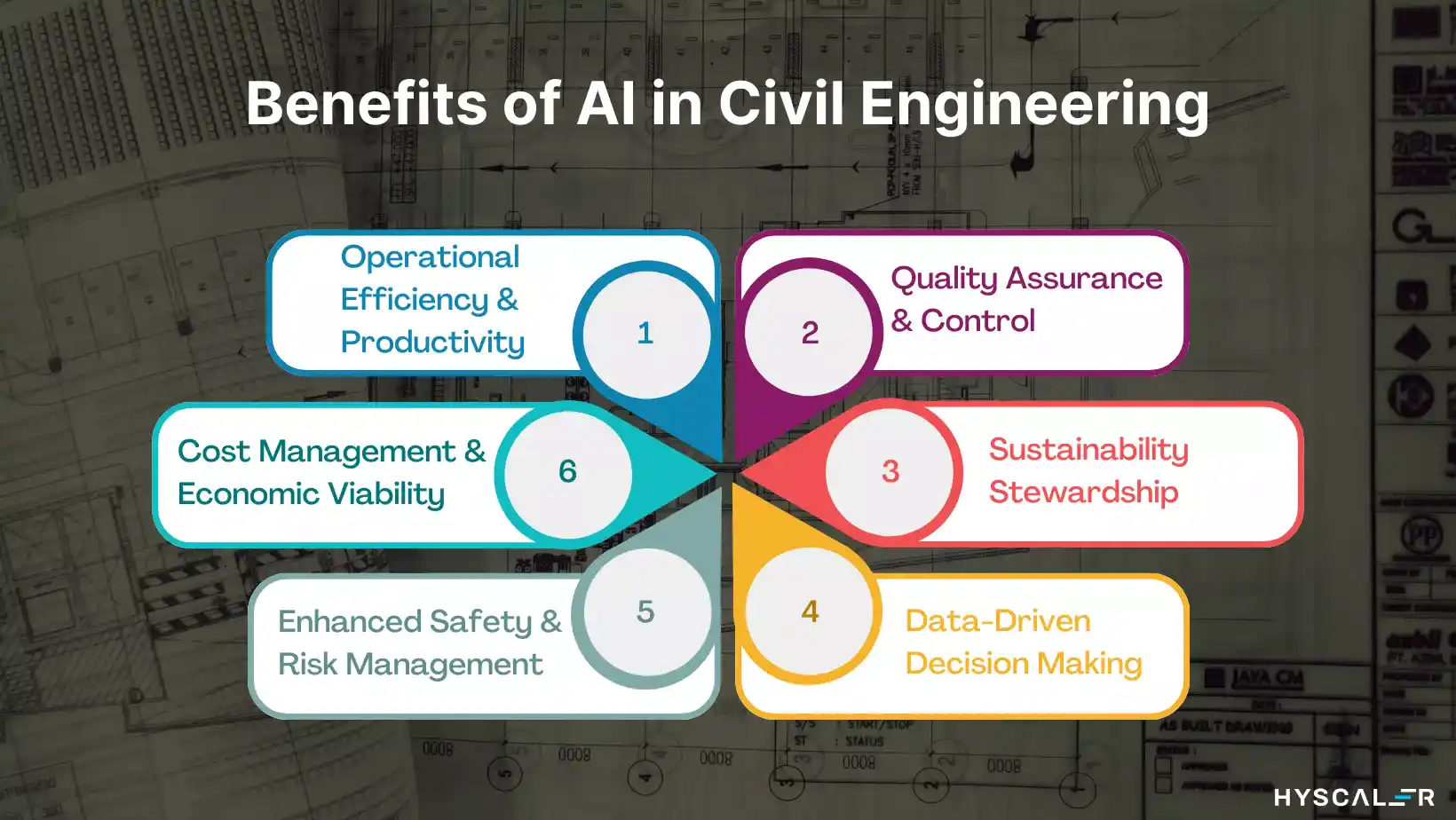Table of Contents
Civil engineering, the bedrock of societal infrastructure, is undergoing a revolutionary transformation with the integration of Artificial Intelligence (AI). This synergistic blend is redefining the boundaries of traditional engineering, ushering in a new era of efficiency, innovation, and sustainability. This blog post delves deep into how AI is reshaping the landscape of civil engineering, promising a smarter and more resilient future.
Types of Generative AI in Civil Engineering
AI in civil engineering encompasses a variety of technologies, each with unique applications:
- Machine Learning (ML): ML algorithms excel in identifying complex patterns and predicting outcomes from vast datasets. In civil engineering, these algorithms facilitate advanced structural analysis, environmental impact assessments, and resource optimization.
- Neural Networks (NNs): These intricate models, inspired by the human brain’s neural structure, are adept at processing multifaceted data. They play a critical role in tasks like predictive maintenance and real-time decision-making in construction management.
AI for Construction and Engineering
In the realm of construction and engineering, AI has become a linchpin for innovation:
- Design and Construction Optimization: AI-driven tools are not only reducing the margin for error in design phases but also streamlining project scheduling and resource allocation. By analyzing numerous variables and predicting outcomes, these tools optimize schedules, ensuring faster and more efficient project completions.
- Enhanced Construction Safety: AI’s role in risk assessment and management is pivotal. AI-driven systems analyze historical data and ongoing site conditions to foresee potential hazards, aiding in creating safer work environments.
The Need for AI in Civil Engineering / Need of AI in AEC (Architecture, Engineering, and Construction)
Contemporary civil engineering faces myriad challenges, from complex construction demands to sustainability goals. AI addresses these challenges head-on by processing large-scale data and enabling predictive insights, leading to smarter, more adaptable, and sustainable infrastructural development.
Use Cases of AI in Civil Engineering
AI’s applications in civil engineering are as diverse as they are impactful:

- Infrastructure Maintenance and Management: AI-driven predictive maintenance is revolutionizing the approach to infrastructure longevity. By leveraging continuous data analysis from sensors and IoT devices, AI systems can predict when and where maintenance is needed. This approach reduces downtime and extends the lifespan of critical structures like bridges, tunnels, and buildings. For instance, AI can analyze patterns in structural stress data to preemptively identify areas that require reinforcement, thus averting potential failures.
- Environmental and Sustainability Assessments: AI’s role in environmental impact assessments is groundbreaking. These models analyze complex datasets to predict the ecological footprint of construction projects, encompassing factors like carbon emissions, energy usage, and resource depletion. By simulating various construction scenarios, AI helps engineers choose designs and materials that minimize environmental impact. This capability is crucial in achieving sustainable development goals and adhering to increasingly stringent environmental regulations.
- Intelligent Transportation Systems: In urban planning and traffic management, AI-powered systems are redefining efficiency. These systems analyze vast amounts of traffic data to optimize signal timings, reduce traffic congestion, and enhance public transportation routes. AI algorithms can predict traffic patterns and suggest alterations to traffic flow, reducing commute times and vehicle emissions. This application is vital in developing smart cities, where transportation efficiency is key to quality of life and environmental sustainability.
- Geotechnical Engineering and Soil Analysis: AI plays a pivotal role in geotechnical engineering by analyzing soil properties and behavior. Machine learning models process data from various sources, including satellite imagery and ground surveys, to predict soil stability, liquefaction potential, and other crucial factors in construction. This application is vital for safe and effective foundation design, especially in areas prone to natural disasters like earthquakes and landslides.
- Automated Construction and Robotic Systems: AI is not just limited to planning and design in civil engineering; it’s also transforming on-site construction processes. Automated construction robots, controlled by AI algorithms, can perform tasks such as bricklaying, welding, and material handling. These robots increase construction speed, improve precision, and enhance worker safety by taking over hazardous or repetitive tasks.
- Water Resource Management: AI systems are being used to optimize water resource management in civil engineering projects. By analyzing patterns in water usage, weather data, and environmental conditions, AI models assist in designing more efficient water distribution systems, predicting demand, and managing wastewater treatment processes. This application is particularly important in regions facing water scarcity and in the context of climate change.
- Structural Health Monitoring: AI-enabled structural health monitoring systems continuously assess the condition of buildings and infrastructure. These systems use sensors to collect data on factors like vibration, temperature, and material stresses, allowing engineers to monitor the health of a structure in real time. AI algorithms analyze this data to detect anomalies, predict potential failures, and recommend timely interventions.
Benefits of AI in Civil Engineering

The advantages of AI in the Architecture, Engineering, and Construction sector are vast:
- Operational Efficiency and Productivity: AI greatly enhances operational efficiency in civil engineering projects. By automating routine tasks and optimizing workflow processes, AI allows engineers to focus on more complex aspects of design and construction. This leads to faster project completion times and increased overall productivity.
- Cost Management and Economic Viability: AI contributes significantly to cost savings in construction projects. By optimizing resource allocation, reducing material wastage, and improving project scheduling, AI minimizes budget overruns. AI’s predictive analytics can foresee potential financial pitfalls, allowing for more accurate budgeting and financial planning.
- Enhanced Safety and Risk Management: AI plays a crucial role in improving safety on construction sites. By analyzing data from various sources, AI can predict potential hazards, thereby preventing accidents. AI-powered surveillance and monitoring systems ensure adherence to safety protocols, reducing the likelihood of workplace injuries.
- Quality Assurance and Control: AI algorithms assist in maintaining high standards of quality throughout the construction process. By constantly analyzing construction data, AI can identify deviations from set standards or potential defects, ensuring that the final output meets the desired quality benchmarks.
- Sustainability and Environmental Stewardship: AI aids in making environmentally conscious decisions throughout the construction process. From optimizing energy use to selecting sustainable materials, AI helps in minimizing the environmental footprint of construction projects, aligning with global efforts towards sustainability.
- Data-Driven Decision Making: With AI, decisions in civil engineering are no longer based solely on intuition or experience; they are increasingly data-driven. AI systems analyze vast amounts of data to provide insights.
Related Articles
Let’s Work Together
The integration of AI into civil engineering is an exciting journey towards redefining the industry’s future. Together, let’s build a future that is efficient, sustainable, and intelligent.
Conclusion
The integration of AI in civil engineering is a testament to the incredible advancements in technology and its potential to redefine industries. As we embrace this era of smart engineering, the possibilities are limitless. From building smarter cities to creating sustainable infrastructures, AI in civil engineering is not just a futuristic concept but a present reality, paving the way for a brighter, more efficient tomorrow.